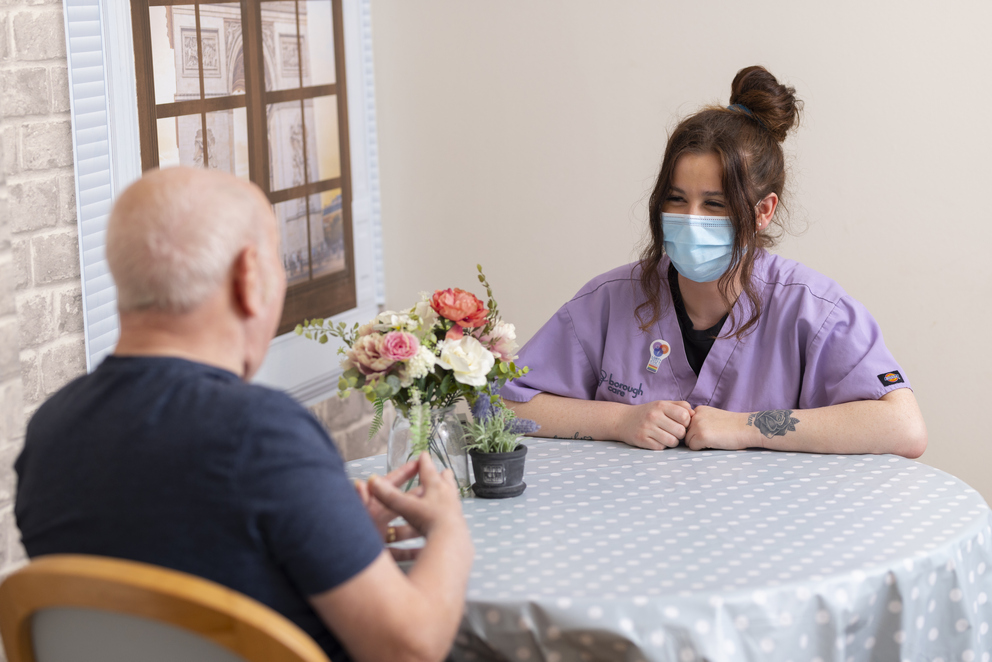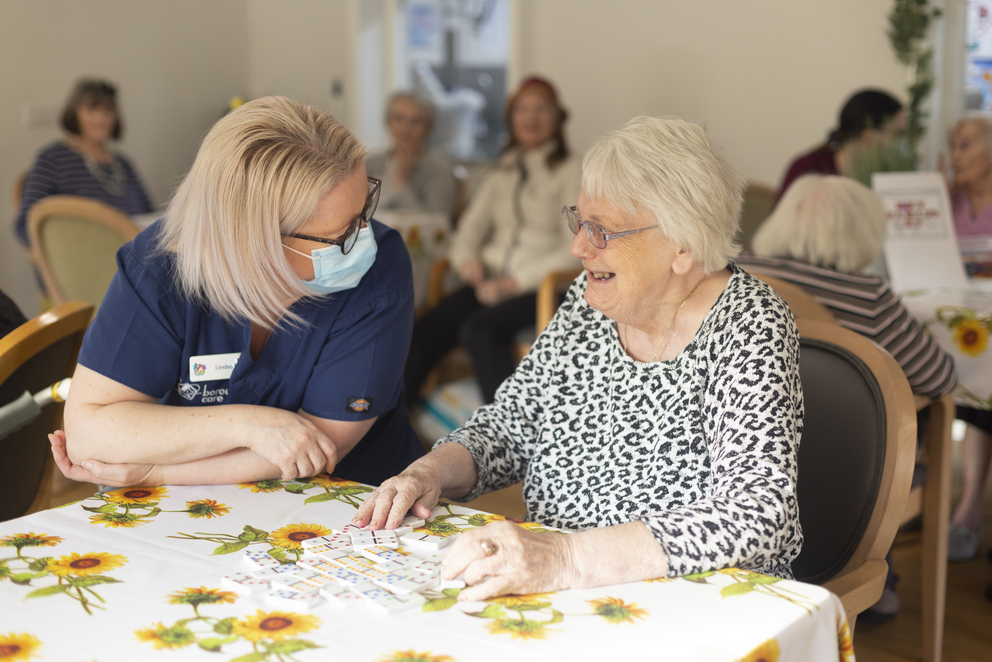A dementia diagnosis can leave you and your loved ones feeling worried, upset and even frustrated. We understand that there’s a lot to take in and that it might be hard to consider what your next steps will be. In this guide, we’ll be sharing more information about how you and your loved ones can better understand dementia, talk about dementia and find support to help you live well with dementia.
Contents
Understanding dementia
Dealing with a dementia diagnosis
Talking about dementia
Living well with dementia
Understanding dementia
There’s a lot to learn and information to absorb when you or a loved one is diagnosed with dementia. As dementia is often misunderstood, we wanted to break down some of the key things to know about the disease.
What is dementia?
Dementia is a wider term used to describe a group of symptoms that occur when specific diseases or conditions affect the brain. It is not a disease in itself. There are over 200 different types of dementia, but the most common are:
– Alzheimer’s disease
– Vascular dementia
– Lewy body dementia
– Frontotemporal dementia
– Mixed dementia
Alzheimer’s disease is the most common cause of dementia in the UK, affecting approximately 6 in every 10 people with dementia. Most cases of Alzheimer’s disease occur in those aged over 65, however, 5% of people with the disease are under 65. This is called early-onset Alzheimer’s.
Vascular dementia makes up 20% of all dementia cases in the UK and occurs when blood vessels in the brain are damaged.
Frontotemporal dementia (FTD) is a rarer form of dementia caused by a build-up of proteins in the frontal and temporal lobes of the brain, which makes up 5% of all dementia cases.
Mixed dementia describes multiple types of dementia occurring at once. For example, you may experience both Alzheimer’s and vascular dementia.

Who is affected by dementia?
Dementia can impact anyone at any age, but it’s most common in people over 65. Everyone experiences dementia differently, and there are many different ways that dementia can affect someone. Symptoms often vary depending on the type of dementia, the underlying condition that is causing the dementia, and which parts of the brain are impacted. The most common symptoms, however, are memory loss, confusion and speech problems. Whilst dementia may get worse over time, there is a lot that can be done to ensure that those living with dementia can live full lives. To find out more about the different types of dementia, visit the NHS website.
Dealing with a dementia diagnosis
A dementia diagnosis can create a sense of fear and worry and can be a lot of information to take in. If you find yourself feeling this way after you or a loved one is diagnosed with dementia, make sure to give yourself time to absorb the information and think about what the diagnosis means for you both. It may be helpful for you to research more about the condition online or to speak to a medical professional – whatever you feel most comfortable doing.
After taking the time to reflect on the diagnosis properly, you may want to start thinking about what your next steps are. This could include organising a needs assessment from your local council and looking into what local dementia services exist in your area.
Carrying out a needs assessment for dementia
A needs assessment is an assessment carried out by a local Council Officer about your specific needs. This is to help your local council understand more about what is required for your care, and will involve answering a few questions about how you manage everyday tasks. To find out more about what you may be entitled to, visit our care home funding page.
Researching local dementia services
You may be able to access specialist dementia services within your local area to help find support following your or your loved one’s dementia diagnosis. Depending on the area, the types of services, and equipment available will vary, e.g. home care services, specialist equipment, and home adaptations. To find out more about the dementia services available in your local area, visit the NHS website.
Other helpful resources
Some other resources to visit for further helpful advice are:
– Alzheimer’s Society – Dementia Connect support line on 0333 150 3456
– Dementia UK – Admiral Nurse Dementia Helpline on 0800 888 6678

Talking about dementia
Making the first step towards talking about your, or your loved one’s, dementia can be difficult to do. A dementia diagnosis is a life-altering piece of information that you may not feel comfortable speaking about for some time. If you’re struggling to begin talking about your, or your loved one’s, dementia diagnosis, we wanted to share our advice on how you can begin to approach the subject in a way that makes you both feel as comfortable as possible.
Telling your loved ones about your dementia
When you feel comfortable sharing your dementia diagnosis with a loved one, we recommend that you tell them as soon as possible. While it can be difficult to make that first step, having a support network around you can make all the difference. Many people don’t fully understand dementia, and all the different types of dementia, so a good place to start is by explaining to your loved one what your diagnosis is (e.g. Alzheimer’s Disease, frontotemporal, mixed dementia) and what it means. If you feel comfortable sharing more details, then explaining the specifics of how the diagnosis will impact you and your loved ones could be particularly beneficial to share to help your loved ones better understand your dementia.
Communicating with a loved one with dementia
Dementia can be an upsetting and difficult disease that may cause challenges in communication or friction between you and your loved ones. When speaking to a parent or loved one about their dementia, it’s important to bear in mind that they may communicate differently from how they did before their diagnosis. If you’re feeling unsure about how to approach speaking to someone with dementia, we’ve put together a list of things to keep in mind as you communicate.
1. Don’t argue with your loved one
We understand that it can be confusing and sometimes even distressing speaking to a loved one with dementia as they may not recall things you’ve discussed moments, days or years ago. Keeping a calm mind and creating a safe environment will help you to communicate clearly with those you love.
2. Repeat and reassure
If your loved one is struggling to recall an event that happened or something that you said, don’t tell them “I told you!”. Instead, repeat the information. It’s important to ensure that your loved one is reassured and feels safe in your company. We understand that it can be difficult to repeat yourself but, patience is key when talking to anyone with dementia as it’s important that they don’t feel judged.
3. Encourage and be patient
As dementia affects the brain, causing problems with memory and understanding, your loved ones may find it harder to communicate with you. They may struggle to recall conversations and events or take longer to respond to you. This is why patience is essential when you communicate with a parent or loved one with dementia. When speaking to someone with dementia, you want them to feel at ease, supported and encouraged. Being patient will help to create a sense of calm. For more advice on how to communicate with a loved one with dementia, take a look through this helpful guide.

Living well with dementia
A dementia diagnosis does not determine who you, or your loved ones, are. You’re still the same person and, with the right help and support, can continue to live a full life.
Establishing a routine
Putting together a routine, or continuing with your existing routine, is a great way to stimulate your memory daily. To help track tasks, try creating a weekly timetable that you can put on the wall. Carrying out familiar tasks every day will also help to create a sense of reassurance. If you’re looking to offer support to a partner, friend or family member with dementia, helping them to establish a routine could be very beneficial for you both.
Creating a dementia-friendly living space
There are a few tweaks that can be made to make your home fit your needs after a dementia diagnosis. This could be small things like keeping a list of helpful numbers next to your phone, labelling cupboards or doors, and making sure that your space is free of trip hazards. Or, you could carry out more permanent changes like purchasing better lighting to help you move around easier. Following a needs assessment, you may be able to access free resources to make your space suit your needs. For further support, ask a loved one if they can assist you with the process.
Keeping healthy to help your dementia
Looking after your physical and mental health is especially important when you have dementia. Eating a balanced diet and doing regular exercise, such as a daily walk, not only helps you stay physically fit but also benefits your mental health.
Talking to others about dementia
Sometimes, talking to other people about what you’re going through with your dementia can be a great way to clear your mind of excess stress. You may feel most comfortable speaking to a loved one but, if you’d prefer to speak to a professional, reach out to your GP to find out more about what talking therapies and treatments are available. If you’re looking to offer support to a parent, friend or family member who’s experiencing dementia, ensure that you create a safe, calm environment where they don’t feel pressured to share more than they’re comfortable sharing. Be considerate and patient.
Discover our dementia-friendly care
For more expert advice on dementia, speak to our team of specialists who will be happy to support you and your loved ones in getting the right care. To find out more about our dementia-friendly care homes across Stockport and Staffordshire, visit our homes page. Follow us on Twitter, Instagram, Facebook and LinkedIn to see how residents across our homes live life in colour.








